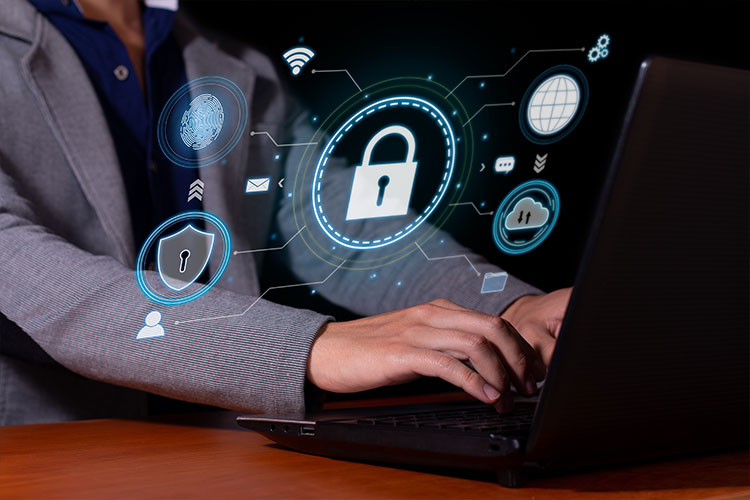Protecting Student Data and Devices
We all worry about losing our data or “having our devices tampered with. Our laptops”, smartphones, and tablets are packed with personal details, notes, and sometimes sensitive work.
Here are a few tips to keep your devices and data safe:
- Use Strong Passwords:Pick passwords that mix letters, numbers, and symbols. Change them often and avoid using the same password across different sites.
- Regular Updates: Make sure your software and apps update automatically. These updates fix issues and help block new threats.
- Back-Up Your Data: Use cloud services or an external drive to save important files. That way, if something goes wrong, you won’t lose everything.
- Install Antivirus Software: A good antivirus program can spot threats and keep your device running smoothly.
Securing Wi-Fi Networks in Student Housing
Student housing often means shared spaces, which can be risky if your Wi-Fi isn’t adequately secured. Many of you won’t trust someone tapping into your network without permission.
Here’s how to keep your internet connection safe:
- Change Default Router Settings: Out of the box, many routers have default usernames and passwords. Change these right away.
- Use WPA3 or WPA2 Encryption: Make sure your router uses the latest security standard. This makes it much harder for outsiders to break in.
- Separate Guest and Private Networks:Suppose you share your connection. Set up a guest network for visitors, which will keep your personal devices on a private network.
- Regularly Check Connected Devices: Periodically check the list of devices connected to your network. If you see anything you don’t recognise, change your network password immediately.
VPNs and Safe Browsing Tips for Students
Browsing the internet without a VPN is like leaving your door wide open. VPNs are essential, especially when using public networks or when travelling.
Here are some tips:
- Use a Reliable VPN Service: Pick a trusted VPN service that fits your budget. A good VPN keeps your internet activity private and safe.
- Check for Secure Websites: Always look for HTTPS in your browser’s address bar. This means the site encrypts your data.
- Clear Your Browser Cache: Regularly clearing your cache and cookies helps remove unwanted trackers and keeps your browsing history private.
- Avoid Suspicious Links: If an email or message has an odd link, don’t click it. It could lead to a browser site.
Online Scams and Phishing Attacks
Every day, we see warnings about online scams and phishing attacks. These threats are real and often come disguised as harmless emails or texts.
It’s important to stay alert:
- Check the Sender’s Email Address: If you don’t receive an unexpected email asking for personal details, verify the sender’s address. Often, scammers use addresses that look similar to trusted organisations.
- Don’t Share Sensitive Information: Be cautious if you’re asked to provide personal or financial details online. The sender’s stable company will ask for this info by email.
- Report Suspicious Activity: If you suspect asender’seport it to your institution or the relevant authorities. Your report could help proDon’tothers.
- Stay Informed: Keep an eye on local university alerts about common scams. Knowledge is your best friend in these situations.
Protecting Student Finances and Personal Information
“How can I keep my bank details safe?” It’s simple when you know what steps to take. Protecting your finances is just another part of overall digital security:
- Use Two-Factor Authentication (2FA): Add an extra step to your bank and online accounts. This will make it tougher for someone to break in even if they have your password.
- Monitor Your Accounts Regularly:Keep an eye on your bank and credit card statements. Report any unusual activity as soon as possible.
- Be Cautious with Public Computers:Avoid logging into your financial accounts on shared or public devices. If you must, always log out and clear your browsing history.
- Set Up Account Alerts:Most banks offer text or email alerts for transactions. This helps you stay aware of any sudden changes.
Educating Students About Cybersecurity Risks
Knowledge is key when it comes to staying safe online. Many have asked, “How do I know what to look out for?”
Here’s we recommend:
- Attend Workshops:Many universities host sessions on digital safety. Take part and ask questions.
- Follow Trusted Blogs and Forums: Look for advice from experts who write in plain language. Plenty of resources break down the latest threats in the simple terms”.
- Share What You Learn:When you find a helpful tip, please pass it on to your flatmates and friends. A small piece of advice can prevent a big mistake.
- Practice Safe Habits Daily:Whether locking your device or checking your email sender, make these checks a habit. Over time, they become second nature.
Digital and Cybersecurity isn’t just a catchphrase—it’s a real concern that we all need to take seriously. Remember, keeping our digital lives safe starts with a few basic actions. Stay alert, stay safe, and keep your personal information secure.

